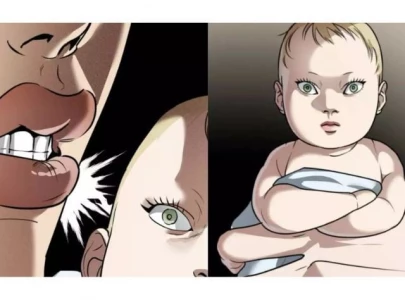
The only phobia that has really stalked this heart throughout its painful journey is of collapsing roof and four walls. But such a fear imbues one with a unique gift of mental agility, consciousness and survival instinct that enables one to see genuine threats approaching from miles away. I have often wondered why my beloved nation that has lived in more or less the same challenging circumstances. That can only happen when one is has given to the fondness for intoxication and altered states of mind. The only altered states of mind my country has known, been obsessed with and fallen in love with are those of authoritarianism, obscurantism and self-induced coma. And the authoritarianism I speak of is not restricted to autocrats alone. Democrats have not been impervious to its temptations either. The founder of this nation refused to let Bengali, the language of the then majority of the country, be elevated to the position of national language along with Urdu. Zulfikar Ali Bhutto was a hawk through and through until the signing of the Simla Agreement. And our sitting prime minister in the late 90s was only a hair’s breadth away from becoming Amir-ul-Momineen.
And yet, it is the autocrats on the horseback who take a bad situation and make it worse. When Ayub Khan assumed power, the cracks within the state and society were thinly veiled, but his prolonged rule witnessed such polarisation among the two wings of the country that Yahya, his immediate successor and a dictator, supervised over the dismantling of the united Pakistan. When Zia took over, Bhutto was already meddling with the internal matters of Afghanistan by flirting with the would-be religious militants. But it was he who perfected the recipe for the Frankenstein’s monster, that apart from destroying lives of countless Afghans, is still out to get us. And after feeble attempts from the Sharif government to distance itself from the Taliban, when Musharraf took over and decided to disown the militant rulers of Afghanistan, he did so in a fashion that quite contrary to the Urdu proverb which suggests that one could not kill the snake but definitely broke the stick (saanp bhi na marra aur lathi bhi toot gayi).
When, last week, I wrote the piece on Afghanistan, my only submission was that if it wants to be treated like a nation, it better start acting like one. Sadly, my own nation has not learned how to act like one. I am yet to come across a more polarising person than General (retd) Pervez Musharraf. The whistle-blower account of Lt Gen (retired) Shahid Aziz reveals how a civil war was risked on October 12, 1999 to save the then aspiring dictator’s neck. Throughout his reign, the man ruled by dividing and further dividing the nation. Today, he is back in the news to divide us further. It takes every atom of my restrain to suggest that instead of a prolonged trial he be sent into exile like Iskander Mirza. But I do so because in my war fatigued and ravaged country, we can do without more controversies and distractions. Never mind precedents, for an unsung hero like General (retd) Kayani established a better precedent of keeping the army away from politics. I desperately want to believe that our civil military elite have come of age. But in the past 10 days, I, as a concerned citizen I have seen the immaturity of our media, our politicians and those faujis who cannot tell the difference between a dictator’s legacy and the army’s integrity. The language used by all three is unacceptable. Musharraf’s uncanny gift of discord notwithstanding it is our readiness to divide all the time that worries me most.
When I left home to study, the working class values that brought me up sent me off with three idols — namely family, faith and patriotism. The first two vanished soon. The last one remains. If, sirs, you cannot make peace with what you see in the mirror then I implore you to free me of the third so that I can go elsewhere and find true happiness in life.
Published in The Express Tribune, April 12th, 2014.
Like Opinion & Editorial on Facebook, follow @ETOpEd on Twitter to receive all updates on all our daily pieces.
COMMENTS (12)
Comments are moderated and generally will be posted if they are on-topic and not abusive.
For more information, please see our Comments FAQ

1732883922-0/diddy-(48)1732883922-0-165x106.webp)

1732881115-0/disney-(1)1732881115-0-165x106.webp)








@ Mr. Lakhani: You may want to add : the biggest mistake Ayub Khan made was to induct Bhutto into his cabinet and the biggest mistake Bhutto made was to have appointed Zia as Army Chief ( we know what the megalomaniac's motives were, but they backfired ).
While recounting Mr. Jinnah's mistakes, you may also want to ask yourself the question; what chance would a person by the name of Jinnahbhai Poonja ( subsequently shortened to Jinnah ) with roots in the Kathiawar state of Gujurat, India have had in the ethnically divided and Punjabi dominated Pakistani political landscape of today?.
@ Shahid: From what I've read so far about Mr. Jinnah is that he could hardly speak Urdu, only a smattering; and unless you can prove me wrong, I don't believe he spoke any Gujrati, either. From all accounts, the only language he spoke was English. In fact, in Dec. 1915, when Ghandi arrived back from South Africa, Mr. Jinnah presided over the reception for Ghandi, in Bombay, making his speech in English; while Ghandi spoke in Gujurati. It does not automatically follow that one speaks the language of his or her mother. What a child speaks at home isn't always the mother's language; it's generally true, but there are millions of exceptions all over the world. I am one of them; my mother language is Punjabi, but I don't speak a word of it. Mr. Jinnah belonged to a minority within a minority; someone with his background would have felt totally alienated in Pakistan. Had he any idea that the separate space he succeeded in creating for some, not all of the Muslims of India would becoming a breeding ground for all kinds of hatreds, he would have gone back to his home in Hampstead.
Farrukh Khan Pitaf seems to ignore the charges against Musharraf. There is a law of the land which should be respected by all and sundry. Ignoring laws serve no one except the law breakers. Every Pakistani is pleased that the country is now on the road to democracy. There may be flaws but it does not mean that we should throw away everything the country has strived for. For the attention, Pitaf, I refer to the charges against Musharraf are that he [1] issued an order holding the Constitution of Pakistan in abeyance [2] he empowered himself to amend the constitution and suspended Fundamental Rights enshrined in the Constitution. [3] he changed the oath of office of judges resulting in removal of judges.[4] on 20 November 2007 he amended the Constitution [5] on 14 December he further amended the constitution. For full details refer to http://tribune.com.pk/story/689495/musharraf-treason-trial-statement-of-formal-charges/ I ask a simple question. "Should someone however powerful, be allowed to ignore the law of the land?"
Shahid good post.
The biggest mistake Jinnah made was declaring Urdu the national language, despite the country having more Bengalis speakers than all other languages combined. The biggest mistake Bhutto made was refusing to recognize Mujeeb as the legally elected prime minister of the country. The biggest mistake Zia made was executing Bhutto. The biggest mistake Nawaz made was appointing Musharraf the COAS. And we know the biggest mistake BB made: marrying AAZ!
This article is written in the ecstatic state of intellectual and moral supremacy that we witnessed when a supreme court judge started his national bashing by the phrase, "pity the nation". Pervez Musharraf is the withered leaf of the tree of history and every brave soul is playing with it like a football. Every now and then we see our intellectuals lamenting on the division of this nation that was initiated by Musharraf. Do they want that static, retrogressive state of our society to continue which was nurtured during Zia regime and which is still haunting us? Every nation that shows prospects of tearing apart the iron clad of old traditions and enter into a new era of history, faces such division. This is the spirit of time and the forces of societal progression that are at work. Musharraf was simply an agent of these historical forces that doesn't like stagnant waters. If he would not appear at the helm of affairs, some other group would have initiated this process of change. This is a good omen that we see rifts in our society. The old traditions and social institution are shattering and we are stuck to the shreds of this outworn cloth, weeping like Jews across the Western Wall. The ever changing nature of time will not let you stay in one state for a long period of time. Either you will consciously adjust to the demands or be vanished from the face of earth. What Musharraf did was to set in motion this transition which was nurturing in the womb of time. It was sure to create divisions in the society because the rigid forces cannot let go their superiority and will fight to death to regain the old order that guarded their interests. But there is sure to emerge a breed of people who will embrace this call from the skies. The split is a natural consequence and violence is sure to be used from the rigid circles to keep this transition in check. This is what happened repeatedly in different societies and cultures that went through this change. When this phenomenon happens, the society clings to terminology and fights over words that have lost their meanings. We see the terms like extremism, secularism, liberalism and this list goes on. This is the barometer of judging that a society is going through a phase of change and the birth of new societal values is causing pangs The rational response should be to invent new terms that have meaning in the current scenario. When our religious leaders were discussing irrelevant issues in Baghdad, the forces of social nature were preparing Hulagu Khan to bring about change. So don't lament on the division of society as it is a welcome thing. Just try to interpret and read out what the historical forces demand from the thinking minds. Grasp the spirit of time and set yourself for the reform of this society.
What a wonderfully written article. To top it all this last bit: "When I left home to study, the working class values that brought me up sent me off with three idols — namely family, faith and patriotism. The first two vanished soon. The last one remains. If, sirs, you cannot make peace with what you see in the mirror then I implore you to free me of the third so that I can go elsewhere and find true happiness in life." I can only second you on this. But I feel the reason for this is because the country is in turmoil and we feel it needs 'our' attention to help save it. I have met many Indians who are not that much interested in conditions back home, because they think the country is following the path of evolution and is moving forward, slowly but surely. As for achieving happiness is concerned, it helps if your memories are bad.
Last week it was Afghanistan that was 'no good', this week it is Pakistan. Between two such neighbours, how can you make peace? Freedom and happiness beckon you.
You are free to go anywhere, if they would take you, Mr Pittafi.
The founder of this nation was not a native Urdu speaker but was a Gujarati. Urdu was chosen to be the official language of Pakistan because it was the lingua franca of the Muslim communities even in Bengal. No other language had this position. You might not know that the official/national language of India - the darling of our self styled liberals - is Hindi. Entire set of south Indian languages comes from a Dravidian origin unlike the north Indian languages which come from Sanskrit and its derivatives. The differences between Hindi and the south Indian languages are enormous and yet there was no issue and Hindi is to date the official language of India. Urdu - which really is the same language as Hindi with the exception of script - on the other hand is extremely close to all the languages of Pakistan, and yes, even Bengali. That was the reason language was not made an issue except by a small but vocal minority who simply had not reconciled with the partition of Bengal. Most Bengalis had no issue with it; it was made into a big issue also by those who in Pakistan's establishment could not live with out the language of their mental masters, the English.
Of course our benign friends Russians had no part in the whole affairs. Bhutto bent over backwards to accomodate every Russian installed government in Afghanistan starting with Daud Khan but Russians wanted no part of it. They could not live with their own hand picked rulers even and after slaughtering every one of them they finally moved in themselves for the final kill. So dear Pitafi sahib we have had enough of this history re-writing. The catastrophes that we are dealing with today are the direct consequence of the Russian imperial plans which our author does not even obliquely refer to and the help and support that they got from those amongst Pakistani's for whom the only salvation is the West, be it red or not. They are not ready to stand on their own and throw away the chains of mental and ideological slavery.
Sir you please go ASAP.
Sir, every atom of my restraint suggests that you better go elsewhere. The problem that I see so clearly is that people who so much crow about dictatorship fail to see the face of democracy glaring right back. The dictators never followed a successful democracy. Failed democracy was followed by dictators. If you would like to see democracy flourish in Pakistan then you should write each time about how important it is that the civilians and politicians alike deliver for the nation. When that happens I will guarantee you no military general would even think about taking over. On the other hand if they loot the country dry and mismanage every single institution (as every PPP and PMLN govt of the past) then it is the people who will clamor for the next dictator to take over. That is our legacy, there's only one way to change it, and unlike the remedy that is being followed, crucifying Musharraf is not the answer.